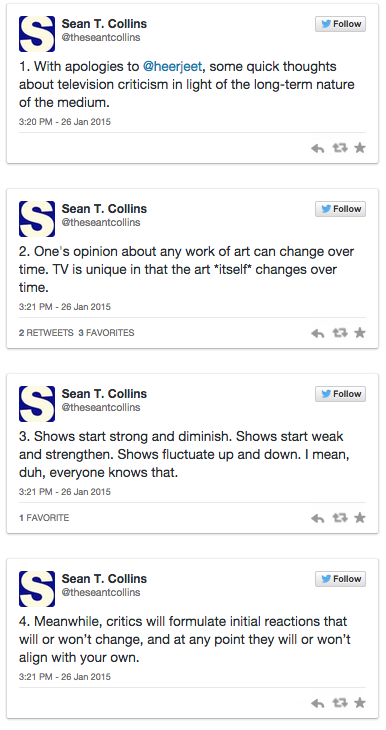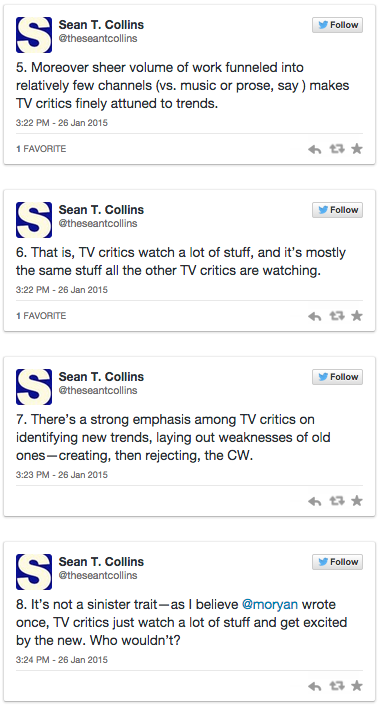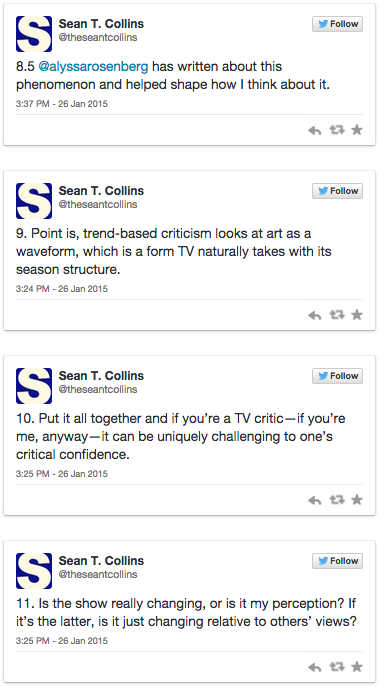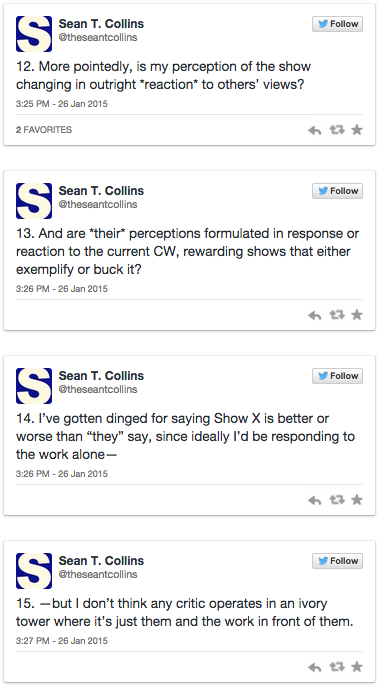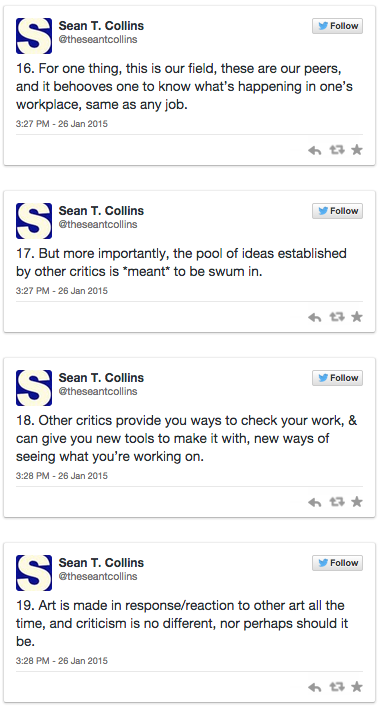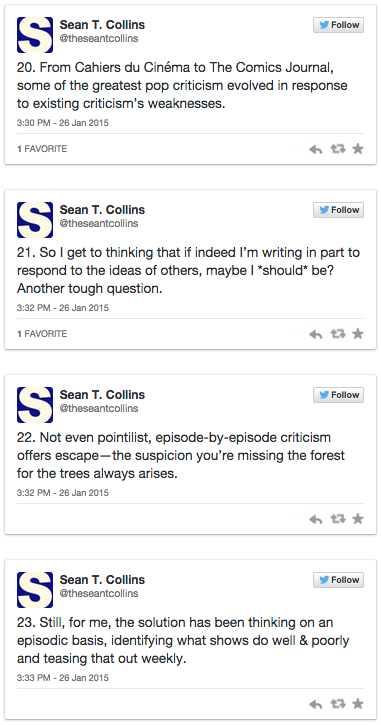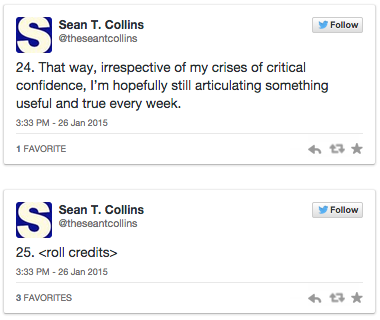Posts Tagged ‘tv criticism’
Why Do Dads Watch TV Standing Up?
June 10, 2025The Best TV Shows of 2024
December 16, 20242023-2024 Bonus Entries
(Excellent shows that started last year and ended up on a lot of 2023 lists but which didn’t air their final episodes till January 2024)
Monarch: Legacy of Monsters

Created by Chris Black and Matt Fraction; based on the work of Ishirō Honda and others (Apple TV+)
The best compliment I can pay this spinoff series from the Legendary Godzilla/Kong movie series, which in quality ranges from dumb fun to just plain dumb, is this: I remember the romance better than the monsters. Actors Wyatt Russell, Mari Yamamoto, and Anders Holm capture the spark and the ache of a love triangle as well as I’ve seen it done, pretty much, with Anna Sawai providing an echo as their younger counterpart. The season finale reunion between Russell’s aged character (played as an older man by his father Kurt) and Yamamoto’s time-marooned one, scored by the Ross Brothers, is movie magic plain and simple.
Fargo

Created by Noah Hawley; based on the work of Ethan and Joel Coen (FX/Hulu)
A strong contender for the strongest overall season of Noah Hawley’s still-controversial Coen Brothers homage, this most recent entry shares many of its predecessors’ concern with the rapacious forces on the move in America today, personified by Jon Hamm’s monstrous enforcer of the patriarchy, Sheriff Roy Tillman. Its bold contention, embodied by Juno Temple’s brave battered wife Dot Lyon, is that we don’t have to swallow what they feed us.
The Curse

Created by Nathan Fielder and Benny Safdie (Paramount+)
Like Too Old to Die Young, the first season of Them, and the Adult Swim Infomericials This House Has People in It and Unedited Footage of a Bear, this cringe-horror masterpiece feels less like a television program and more like an acute, crescendoing mental health crisis. I hated, hated, hated the pilot, which I thought was smug and self-congratulatory about the dark side of liberal do-gooding; by the end of the nightmarish and somehow prophetic finale I thought I was watching one of the best shows I’d ever seen. I was right the second time.
The Top 15 Shows of 2024
15. The Lord of the Rings: The Rings of Power

Created by J.D. Payne and Patrick McKay; based on the work of J.R.R. Tolkien (Prime Video)
Jeff Bezos is an evil man, and he prefers to keep the company of evil men these days, so I wish I could say that this show was as much an embarrassing folly this season as it was during its initial installment. Alas! Like The Wheel of Time and Foundation before it, it got gud, son. The credit is largely due to the emotionally and physically abusive relationship between Charles Edwards’s Da Vinci–like Elf genius Celebrimbor and Charlie Vickers’s gaslighting Dark Lord in sheep’s clothing, Sauron. This season made me understand why these particular guys wanted to make this particular show. I felt the purpose.
14. Presumed Innocent

Created by David E. Kelley; based on the book by Scott Turow (Apple TV+)
Clive Barker once explained that he made his monsters sexually compelling because that’s the only convincing way to write characters stupid enough to open the door that has the reader shouting “Don’t go in there!” Kelley’s adaptation of Turow’s legal thriller rightfully focuses on the explosive sexual connection between Jake Gyllenhaal’s leading man and his other woman, played in flashback by Renate Reinsve. If they make you believe in that, they can make you believe anything else. Bonus points for the insufferable antagonists muttered into life by Peter Sarsgaard and O.T. Fagbenle.
13. Tokyo Vice

Created by J. T. Rogers; based on the book by Jake Adelstein (Max)
How often do you get to say “this stylish, sumptuous crime thriller” and really mean it? But Tokyo Vice‘s second season was all that and more — an almost Dickensian (apologies to David Simon) look at the underbelly of a lost time and place. It delivered on everything the first season only promised.
12. The Old Man

Created by Jonathan E. Steinberg and Robert Levine; based on the book by Thomas Perry (FX/Hulu)
Another sophomore outing that bettered its already pretty good first season by a substantial margin. This season’s setting in the rugged wilds of Afghanistan gave it mythic last-gunslinger gravitas. It’s a fine showcase for the formidable talents of Jeff Bridges and John Lithgow, but this was really young gun Alia Shawkat’s time to shine.
11. The Regime

Created by Will Tracy (HBO/Max)
In this sharp and subtle satire that actually looks as interesting as its dialogue reads, a mentally ill autocrat and her also mentally ill macho object of obsession plunge their country into a whirlpool of quack medicine, economic ruin, diplomatic isolation, and civil war. I dunno, it all seems funnier when Kate Winslet does it.
10. Fallout

Created by Graham Wagner and Geneva Robertson-Dworet; based on the games by Tim Cain, Leonard Boyarsky, and others (Prime Video)
Though it’s one of the more egregious offenders in this year’s woeful trend of truly over-the-top teal-and-orange color grading, Fallout can be forgiven: The blue-and-yellow jumpsuits were taken right from the game, and there’s only so much you can do when you’re filming a desert wasteland against an azure sky of deepest summer. That aside, this is an unexpectedly nasty and batshit anti-capitalist/anti-American post-apocalyptic sci-fi satire from your friends at Amazon. The lead performances of Walton Goggins as a strangely sexy revenant and Ella Purnell as a pretty straightforwardly sexy fish out of water sell the whole thing.
9. Disclaimer

Created by Alfonso Cuarón; based on the book by Renée Knight (Apple TV+)
Disclaimer features arguably the year’s hottest scene and its most harrowing. It’s a sinister little dance between Cate Blanchett in glamorous Tár mode and Kevin Kline as the kind of English schoolteacher you might hear Roger Waters sing about. It’s directed with a unique eye for light and color by Alfonso Cuarón, whose work filming in the ocean feels like yet another technological feat of filmmaking in a career characterized by them. It’s not perfect, but that’s plenty for me.
8. Them

Created by Little Marvin (Prime Video)
While less brain-breakingly brutal and disturbing than its debut season, which is honestly fine with me, the second installment of Little Marvin’s horror anthology series cements returning star Deborah Ayorinde’s place in the pantheon of great horror actors. There’s a fun scary-movie feel to some of the proceedings, which makes the really bitter parts that much harder to swallow.
7. Shōgun

Created by Rachel Kondo and Justin Marks; based on the book by James Clavell (FX/Hulu)
Or: How I Found Out The New York Times Won’t Let You Call An Assisted Suicide Erotic. Featuring at least four of the year’s most memorable performances (Anna Sawai, Cosmo Jarvis, Hiroyuki Sanada, Tadanobu Asano), this tragedy of manners was every bit as epic in feel as its sci-fi and fantasy counterparts. But its emphasis on restraint gave it a ruminative, romantic, melancholy tone all its own.
6. Supersex

Created by Francesca Manieri (Netflix)
A desire for sex so insatiable and profound that it takes over your whole life until there’s not much else left: This is traditionally the stuff of European art films. To my great surprise, and ultimately my benefit, it’s also the stuff of this season-length biopic of the notoriously intense Italian porn star Rocco Siffredi, played by Suburra star Alessandro Borghi. Rocco’s background of poverty and savage bullying, his emotionally incestuous relationships with his mother and brother, his treatment of lust and pleasure as matters of paramount importance no matter the cost — this is livewire stuff, handled with skill, care, and artistry.
5. Sexy Beast

Created by Michael Caleo; based on the screenplay by Louis Mellis and David Scinto (Paramount+)
I know what you’re thinking, because I thought it too: A prequel to the first in director Jonathan Glazer’s run of back-to-back-to-back-to-back movie masterpieces? Best of luck to you! But intrigue got the better of me, and boy am I glad it did. This is — realize I understand the weight of this statement — a worthy companion piece to the original film. As the young thief Gal Dove, James McArdle has incandescent romantic chemistry with Sarah Greene as his true love Deedee, and makes a believable big-brother figure to the strange and belligerent Don Logan (Emun Elliott.) But the romance is messy and complicated and unpleasant, as these things often are. Behind it all lurks Stephen Moyer as up-and-coming gangster Teddy Bass, somehow as terrifying in his way as Ian McShane was in his.
4. Monsters: The Lyle and Erik Menendez Story

Created by Ryan Murphy and Ian Brennan (Netflix)
Ryan Murphy’s empire is what it is, but you do, under these circumstances, gotta hand it to him: Between The People v. O.J. Simpson, The Assassination of Gianni Versace, Dahmer, and Monsters, he’s given us probably all four of the best true-crime miniseries ever made. The story of the Menendez brothers is handled with immense respect for the gravity of the subject matter and backbreakingly frank dialogue as to its horrifying nature. Directed by Michael Uppendahl, the fifth episode, a single shot of two actors, made me sick, as well it should.
3. Interview with the Vampire

Created by Rolin Jones; based on the books by Anne Rice (AMC/AMC+)
Like the first season of The Terror did with Dan Simmon’s sprawling, detailed work of historical horror, the first season of Interview with the Vampire took everything good about its source material, jettisoned everything bad, and improved on the results in every conceivable way. For its second season, IWTV improved on its first season in every conceivable way, ending with its absolute best episode to date. That’s a fucking feat, man. This is the most drama-club goth show ever made, with all the beauty and the bloodshed that implies. With the aid of wrenchingly physical performances by all its leads, it uses the supernatural to supercharge the ecstasy of love and the agony of loss.
2. House of the Dragon

Created by George R.R. Martin and Ryan Condal; based on the books by George R.R. Martin (HBO/Max)
I believe in Westeros. Westeros has made my fortune, such as it is. And I write my reviews in the Westerosi fashion. When a show uses size, scale, spectacle, and the supernatural to convey ideas and emotions, to me it’s like a whole new kind of thing, as much an opera as a drama. These nude incestuous psychopaths flying around on their giant war-crime reptiles are, quite simply, playing my song.
1. Industry

Created by Mickey Down and Konrad Kay (HBO/Max)
I can’t believe I was late to this show. I can’t believe no one told me about this show. I can’t believe no one grabbed me by the shoulders and said Sean, Sean, Sean, this is a show for you. What if Billions, Mad Men, Mr. Robot, and Girls were all the same TV series, and every episode featured sex scenes as frank and explicit as…well, I can’t think of any points of comparison, really. This show treats sex seriously, even as it depicts its rapacious young (and envious middle-aged) hypercapitalists as beautiful sociopaths, their bodies colliding against one another in the water they make their living boiling. As a bonus, you get to watch episode four, “White Mischief,” in which director Zoé Wittock takes Uncut Gems to After Hours school. It’s the year’s most invigorating hour of television, and it feels like this show slapped it down like a casually spent hundred, pulled from a bottomless pocket.
My Rolling Stone Greatest TV Shows of All Time Ballot
October 2, 2022…is now available for your perusal on my Patreon! Go subscribe and see what the hell I’m on about!
Cut to Black is now available on iTunes/Apple Podcasts
April 30, 2021Two aspects of TV criticism I’ve been thinking about a lot recently
March 2, 20181) Every single piece that any critic has ever written and you or I or anyone else has ever read over the past ten years or so about how TV drama is in trouble has been a complete waste of time to both write and read, since there’s basically never more than a month-long stretch between good-to-great shows being on the air. That concept has eaten up SO many column inches at different periods in time, and it’s NEVER been true.
2) Did any major (full-time / on-staff / national) TV critic support Bernie Sanders in the Democratic primary? Can you name one?
Support for Sanders is an insufficient rubric for leftism, obviously; his mild socialism should be the beginning of the conversation. But I suspect that for most entrenched culture writers – I’m singling out TV because it’s the field with which I’m most familiar but I wouldn’t be surprised if this were true in other areas as well – Sanders and his ideology are as out of bounds as they are for, well, every single op-ed page at every major paper in America, at none of which are Sanders supporters or socialists generally represented.
Anyway, this is an honest question: Are any major TV critics Sanders supporters or self-identified socialists? I can’t think of any, but it’s possible I’m overlooking someone.
(FWIW I can think of two or three non-major ones, myself included. And I can think of a couple who are on the left but have ambivalent, primary campaign–related feelings about Sanders himself. That’s…not a lot.)
If I’m not leaving anyone out, I think we’ve discovered a limit to what you’re going to get out of the field.
Wonderland Episode 107: Tropes and Traps in Culture
November 15, 2017I’m a guest on episode 7 of Wonderland, a new podcast series about popular culture as a potential vehicle for political change. I spoke with hosts Bridgit Antoinette Evans & Tracy Van Slyke and my fellow guest Nayantara Sen about the storytelling pitfalls television falls into, and how climbing out of them is an opportunity to both tell better stories and do better political work within them. The conversation is a lot of fun, and the whole series is up all at once, so if you like what you hear, binge the whole thing!
‘The Godfather’ Was Really the First Great Prestige TV Show
April 24, 2017Not to get all Beavis and Butt-head about it, but bad shows suck because, well, they suck, not because they are insufficiently episodic in structure. This is why calls from the critical community, leading many of the fan conversations on these shows, to eschew unified, serialized storytelling in favor of tight arcs and standalone episodes feel like a misdiagnosis. For one thing, they fail to consider that noticeably self-contained installments of series like Game of Thrones and Girls are as memorable as they are precisely because those shows don’t usually work that way.
These claims fall into the same trap of cinematically minded showrunners who insist that “it’s not TV” by agreeing with them, setting up a false dichotomy between what constitutes the proper use of the medium and what doesn’t. In its maturity, television has proven capable of countless things: TV dramas alone can be as densely serialized as The Wire Season 4, as memorably episodic as Mad Men Season 5, as sweeping as Fargo Season 2, and as sensation-driven as Empire Season 1. Sometimes they can be several things at once; Black Mirror, like its groundbreaking antecedent The Twilight Zone, tells a different story with a different set of characters every single episode, making it simultaneously one of the most movie-like and most episodic shows on television. Saying any of these series is closer or farther away from The One True Way to Make TV obscures the fact that there’s no such thing.
In fact, this array of options, this wide-open landscape of different structures and tones and techniques, is the truest indicator that “prestige TV” is not a contradiction in terms. Problems with the execution aside — and problems with the execution is all they really are — television can do whatever you want it to do at this point, and declaring one approach or the other superior is a procrustean blunder — like arguing The Godfather is less great a film because you can break it down like a television series, if you’re feeling particularly perverse (ahem). If that means some showrunners get to declare their series a double-digit-hour movie, so be it. The proof will be in the pudding, or the cannoli. You can have it both ways. Why wouldn’t you want to try?
What was your favorite episode of The Godfather? “Khartoum”? “The Thunderbolt”? The pilot, “I Believe in America”? I presented a modest proposal about a cinematic classic in order to talk about where all the “no, your TV show isn’t a 73-hour movie” structuralist reprimanding gets us for Thrillist.
STC on Inkstuds
October 28, 2016I’m the guest on the latest episode of the venerable comics podcast Inkstuds, hosted by Robin McConnell. I talk about comics, TV, criticism, my history with all three, the Greatest Graphic Novels list I recently did, goth, the anthology @doopliss and I are doing, and more. Check it out!
How to look at an actor
July 14, 2016Though I studied film in college, I came to TV criticism through comics criticism. In comics, everything on the page is intentional. Character design, line weight, color, panel size and arrangement, backgrounds, lettering: A human being set all those things to paper. Every aspect of the image is considered, deliberate. (Obviously personal style is not entirely within an artist’s control, but that’s basically how it works.)
So when I started writing about television, I realized my writing was informed by this not just in terms of how I talked about cinematography, editing, and the like, but with regards to the actors. The look of a face, the sound of a voice, the size and movement of the body, physical comportment: I discuss these as the equivalent of line, design, and so on in comics. This has played a major role in how I’ve processed any number of shows; for several (Boardwalk Empire, Downton Abbey) it may well have been the central thrust of my writing on them. I’m happy with the writing I’ve done driven by this rubric, but the larger point I’d like to make regards thinking about actors visually. Since television and film are visual media, I think this is valid and vital and, if anything, underdone. But there’s a way to do it without objectifying actors, either sexually or as “other,” as several recent high-profile essays on women actors have done.
If you’re a straight man, for example, write about the physicality of men, to whom you’re not sexually attracted. See how it shapes what you say. How Jon Hamm looks, how James Gandolfini sounds when he breathes: These are important aspects of Mad Men and The Sopranos respectively, but not of your sex fantasies. When you write about women actors, you can talk about how they function physically on-screen in the same way—observing, not objectifying. Do this in the context of their work, not how they look eating lunch. Don’t lead with it. If sex/sexuality is part of the role, fine, but try not to sound like you’re sexting or seducing, and talk about their male partners too. Fold your discussion of actors’ physicality into the show or film’s physicality as a whole—wardrobe, set design, sound design, good old-fashioned shot composition.
We need more film/TV writing that’s about more than plot, dialogue, line readings, showbiz talk, and political subtext. Actors are a part of that. We need to write about the appearance of actors, women and men, without it devolving into Penthouse Letters. It can be done!
Art, empathy, and Hal’s Emerald Attack Team
June 11, 2015mramgine asks: Are you familiar with the controversy surrounding what happened with Green Lantern back in the 90s, where Hal Jordan was turned into a supervillain and fans got so pissed that some sent death threats to DC? Why do you think certain creative decisions in media cause such reactions? Are some of these people mentally disturbed or is there some other reason for such behavior?
The Four Worst Types of TV Critics
April 16, 2015“People love hearing how right they are.”—Agent Stan Beeman, The Americans
Last year on Game of Thrones, Jaime Lannister raped his sister Cersei. At least that’s what he did in the scene I saw. Statements on the matter by actors Nikolaj Coster-Waldau and Lena Headey and director Alex Gravestalked about two people in a deeply dysfunctional relationship having sex they knew they shouldn’t be having, not that one person was refusing to have at all. Co-writer and showrunner David Benioff appeared to disagree in an interview taped prior to the episode’s airing, before adopting total radio silence on the issue. The show’s subsequent handling of the characters, author George R.R. Martin’s comparison of the scene to its equivalent in his original books, and further discussion by the actors provided still more complicated and confounding context. We could perhaps conclude that either through communication breakdowns between the players or a failure of execution to mirror intent, the scene — rooted in complex and destructive sexual dynamics between two habitually secretive and duplicitous characters and interpreted by half a dozen artists each with their own ideas about the event — simply got away from them.
Few of us did. Fans of the books lambasted the scene as yet another horrendous, story-destroying decision by Benioff and his creative partner Dan Weiss, two people frequent treated as singularly unsuited to the task of adaptation. Admirers of Jaime bemoaned the damage done to him by the event at least as much as his sister, the victim. Critics saw the scene as a romanticization of rape, using the show’s long and contentious history with female nudity, sex, and sexual assault to support the argument. And while the wider world focused in the latter of these three critiques, the former two were no less self-assured or severe in their respective corners of the critical firmament.
On one level, the reaction to what happened between the Siblings Lannister in the Great Sept of Baelor is just a standout example of the golden rule of arguing on the Internet: interpret with minimum good faith, attack with maximum rhetorical force. But that rule applies to discussions of everything from politics to fly fishing. In terms of art and art criticism, something else is going on—a phenomenon of which the social-justice framework for criticism is just the most well-publicized, hotly debated embodiment.
The past decade-plus has been a time of dispiriting uncertainty and powerlessness: an era of endless war, economic erosion, class disconnection, and political disillusion. At the same time, our approach to art and entertainment has become all the more unequivocal in its assertions about content and quality. We pore over TV shows for clues about their outcome, which we present with power-point precision. We treat all art like editorial cartoons, interpreting it the way we would a drawing of a fatcat politician holding bulging moneybags in each hand, and accept or reject the story accordingly. We treat the comics and novels that form the basis for our blockbusters as holy writ, we insist that fiction hew inerrantly to the facts that inspired it, and we punish those who stray from the path. We elevate our favorite characters and relationships to the point where the stories they inhabit are mere vehicles to get them to the place we’d like to see them go.
In all four cases—the Theorists, the Activists, the Purists, and the Partisans—we’re treating the inherently subjective fields of art and art criticism as things we can be objectively right about. We’re taking work that’s complex and capable of conveying multiple contradictory meanings and reducing it to a simple either/or, yes/no proposition.
In other words, we’re fucking up.
I wrote about the four worst types of TV critics for the Observer.
TV criticism and crises of confidence
January 27, 2015I tweeted some thoughts on TV criticism and crises of confidence in light of the medium’s long-term nature. They were brought to you by the news that I’ll be covering The Americans for the New York Observer this season.

